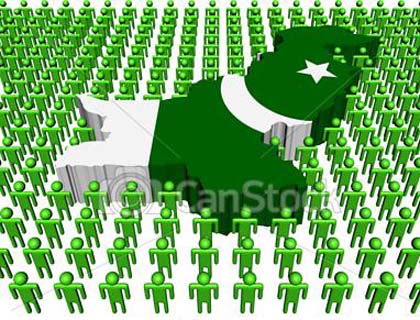Today when extremism has shaken the very basis of Pakistan we must see whether this extremism is the upshot of our nationalism or corollary of the sectarian concept of the religion. Before partition religion was utilized to shape Muslim nationalism in India but now extremism and fundamentalism are used to promote the concept of nationalism in Pakistan.
Here in Pakistan the concept of nation is defined in terms of religion. Therefore ultimately our nationalism is purely based on religious concepts. Before the advent of British, Muslim nationalism was on the rise in the reign of Aurengzeb Alamgir.
As Hindus were local inhabitants therefore their nationalism was totally based on the concept of regaining the control of their motherland while Muslims even after living for centuries in India became victim of ethnocentrism.
The Muslim's fervor of defeating Hindus was totally based on the concept of supremacy of Muslims over the other nationalities. The British were also victim of the same superiority complex. Whiteman burden was the outcome of this superiority complex.
After War of Independence in 1857 Muslims as a nation were suspicious about Hindus and British and even today our people are skeptical about Jews, Hindus and Christians. The common concept of Anti-colonial nationalism brought together All India National Congress and Jaamiat Ullema-e-Hind on the single platform but the religious garb of Gandhi Jee made suspicions in the Muslims' minds and especially Quaid-e-Azam.
Similarly Jaamiat Ullema-e-Hind also lost the support of liberal Muslims. Muslims united under the leadership of secular Quaid-e-Azam for the protection of Muslim's rights and later on supported him for the establishment of separate Muslim state.
But it's a dilemma of our nation that its anti-colonial nationalism converted into anti-Hindu nationalism and now we are victim of ethnocentrism. We consider all other nations as inferior and infidel. But the fact is that we also consider the land of these infidels and inferiors as the land of opportunities.
Quaid-e-Azam was not an extremist but it is a fact that the event of creation of Pakistan has a role in the creation of extremist views against Hindus. It is wonderful that this year at 14th August when Pakistan is burning in the flames of extremism our leaders are still reminding the nation the importance of two-nation theory.
Praising two-nation theory will always keep us apart from India. These negotiations with India are useless if we still consider them the usurpers of Muslims' rights. Will it help us to portray Hindus as contemptible and obnoxious and at the same time advocate the need of friendly relations with India? How can we then declare India as favorite trading nation?
Anti-US sentiments in Pakistan have a different logic. In 1971 when US did not help Pakistan and East Pakistan declared independence then an Anti-US wave emerged in Pakistan.
Even working together with US in programming Jihad in Afghanistan, Pakistan army never tried to create a positive image of US in Pakistan. And this is the reason that in the last few decades I never heard of anti-India rallies but on the other side fundamentalists have several times came on roads against US policies.
Anti-Hindu nationalism is now part of Pakistanis' blood but Anti-US nationalism is easy to create in Pakistan. India is considered a known enemy but US is taken as an enemy that stabs in the back.
In Pakistan the concept of nationalism revolves around the intrigues of Yahood, Hanood, and Nusara (Jews, Hindus and Christians). Here patriotism means having an aggressive viewpoint towards Hindus, Jews and Christians.
The concept of civic nationalism could not develop here. Civic nationalism defines the nation as an association of people who identify themselves as belonging to the nation, who have equal and shared political rights.
The nation is not based on common ethnic ancestry, but is a political entity whose core identity is not ethnicity. Civic Nationalism is a kind of non-xenophobic nationalism and similar in temperament with liberal values of freedom, tolerance, equality, and individual rights.
Simply what I want to prove is the fact that Pakistani nationalism is the result of some events and having a sectarian viewpoint at its back. Debating the negative and positive aspects of two-nation theory, constructive or destructive role of US in Pakistan and propagating the concept of religious tolerance will take decades to change the mentality of Pakistanis.
However there is an alternate solution to the problem. As events have played a role in creating xenophobic nationalism in Pakistan so again events can change the mentality of Pakistanis. Serious attempts to resolve the issues with India will certainly create a new wave of nationalism in Pakistan provided India also feels the ground realities of Pakistani nationalism.
May be I am wrong but US did not seriously attempt to create a positive image of herself. US will have to endeavor like China. But India urgently needs a shift in Pakistanis approach towards India. Here impartial journalists have tried for decades to create an India friendly environment in Pakistan but failed to do so. However serious attempts from Indian side can change the scenario in months.

